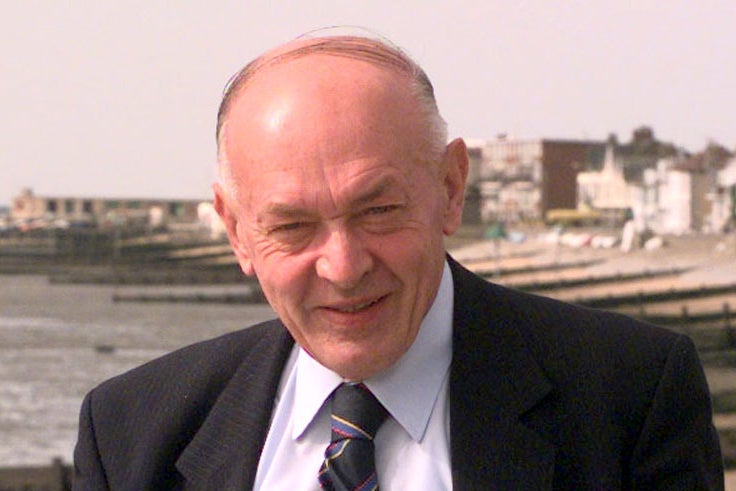Sir Teddy Taylor: populist Tory MP and Eurosceptic who was a thorn in the side of successive leaders
He clashed with Edward Heath in the 1970s and two decades later had the whip withdrawn by John Major for refusing to support votes on the implementation of the Maastricht Treaty

Sir Teddy Taylor, who has died aged 80, was the Conservative MP whose fervent Euroscepticism cost him his post as a Scottish Office Minister in 1971, when Edward Heath decided to take Britain into Europe. Such was his disdain for the idea of the country joining the European Economic Community that he chose to resign rather than remain in Heath’s government.
But this would not be the last time Taylor clashed with the leadership of his party over the issue of Europe. In 1994, eight Tories – including Taylor – had their whip withdrawn by John Major for refusing to support votes on the implementation of the Maastricht Treaty. With a Conservative majority of just seven seats, the “whipless eight” potentially held, for a short time at least, considerable power. Heath, by now a backbencher but still fiercely supporting his pro-EU position, even went as far to suggest that “If they want an election on Maastricht, they can form their own party”.
The following year, Taylor voted for the equally Eurosceptic John Redwood, in preference to John Major, in the party’s leadership election. Taylor remained consigned to the backbenches, whence he maintained his disdain for the European project.
Edward Taylor was born in Glasgow in 1937 and educated at Glasgow High School and Glasgow University, where he joined the Scottish Unionist Party, later to become the Conservative Party. He had initially worked as a journalist before turning his focus to politics.
Taylor first ran for election to the Glasgow Springburn constituency in 1959 but lost against Labour’s John Forman. He won at Glasgow Cathcart in 1964, becoming the youngest MP in the house, aged just 26. He soon gained a reputation for his formidable memory for facts and figures, outspokenness and consistency of his opinions.
As a staunch advocate of capital punishment, he sought in 1974 to introduce a bill to restore the death sentence that had been abolished nine years earlier. When, the following year, a police officer in London was murdered by an IRA gunman, Taylor again insisted that “the answer was return of capital punishment”.
A popular MP, who was re-elected four times to Glasgow Cathcart, Taylor was eventually defeated in the 1979 general election by Labour’s John Maxton. He stood again in 1980, this time at the Southend East by-election, and won. He remained MP for this constituency (later renamed Rochford and Southend East) until standing down in 2005 after more than four decades of Parliamentary service. His wife Sheila said: “He loved being an MP here. The great love of his life was helping his constituents. He really cared about Southend and was very well-liked by everybody here.”
Taylor published two books, the novel Heart of Stone (1968) and Teddy Boy Blue (2008), a memoir. He was famously a fan of reggae music. He was knighted in 1991.
James Duddridge, the current MP for Rochford and Southend East, said: “He gave everything to his political life. Teddy spent much of his life opposed to British membership of the European Union. We campaigned together for Brexit and it is some comfort that, before he passed, he had seen the country come around to his way of thinking.”
Sir Edward Macmillan Taylor, born 18 April 1937, died 20 September 2017
Subscribe to Independent Premium to bookmark this article
Want to bookmark your favourite articles and stories to read or reference later? Start your Independent Premium subscription today.

Join our commenting forum
Join thought-provoking conversations, follow other Independent readers and see their replies